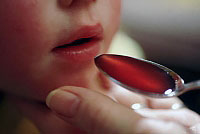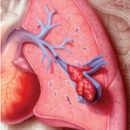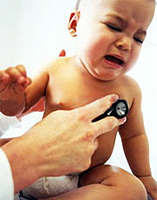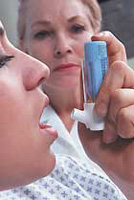Treatment of bronchitis depending on the form. What drugs use the therapist in the treatment of acute and chronic bronchitis, including obstructive.
Content
Bronchitis treatment is a major task. A very high risk of process chronicization causes any therapist to take great attention to each patient. Applies the entire arsenal of funds with which medicine has.
Treatment of acute bronchitis
 Most often cause viruses. Therefore, in the treatment of acute bronchitis, the purpose of antibiotics in the first hours, which have passed since the beginning of the disease, meaningless.
Most often cause viruses. Therefore, in the treatment of acute bronchitis, the purpose of antibiotics in the first hours, which have passed since the beginning of the disease, meaningless.
Hospitalization with most cases do not need. The treatment is made outpatient and begins with the appointment of abundant warm drink (tea with lemon, raspberry jam or honey, preheated mineral waters).
In the first day, two from the start of the bronchitis are effective antiviral drugs of type Remanthadine. Also apply immunomodulatory funds (interferon).
Antibiotic therapy becomes relevant only in some cases:
- The appearance of purulent sputum (sign of bacterial infection);
- Patient over 50 years old (high risk of bacterial complications);
- Recurrent bronchitis with incomplete recovery from past illness.
In all these cases, treatment begins with drugs of macrolides: spiramsycin, erythromycin, azithromycin. Antibiotics of penicillin row are less effective in acute bronchitis: ampicillin, amoxicillin, Augmentin.
The probability of the development of candidial lesions of the vagina in women and disorders of the intestinal microflora has all patients, regardless of gender. Fluconazole and / or Linex are prescribed for their prevention (options: subtilles, bifidumbacterin).
 Depending on the disease stage, antitussive and expectorant drugs can be assigned. The first are used at the beginning of the disease, when there is no discharge of sputum. These include Liebexin, Glaucin, Broncholitin, Salpadeev. The second is used for thinning and improving sporming of sputum when it is already synthesized in sufficient quantities. To this end, ambroxol, bromgexine, acetylcysteine are used.
Depending on the disease stage, antitussive and expectorant drugs can be assigned. The first are used at the beginning of the disease, when there is no discharge of sputum. These include Liebexin, Glaucin, Broncholitin, Salpadeev. The second is used for thinning and improving sporming of sputum when it is already synthesized in sufficient quantities. To this end, ambroxol, bromgexine, acetylcysteine are used.
Antipirers (antipyretic) are used by increasing body temperature more than 38 degrees and severe breast pain. Possessing a painful properties, aspirin, ibuprofen and paracetamol significantly reduce the temperature, reducing and brightness of pain. It should be borne in mind that aspirin children under 15 years old is absolutely contraindicated. This is due to the risk of the appearance of the Reee syndrome — The hardest and irreversible damage to the liver and brain.
Treatment of chronic bronchitis
In the treatment of chronic bronchitis, especially its obstructive form, the medical tactics change somewhat. First place here are measures to normalize the respiratory function. For this you need:
- remove the wet wet accumulated from the bronchi;
- increase bronchial lumen;
- reduce the severity of the inflammatory response.
The liberation of bronchi from sputum is produced in two ways: drug and non-drug.
The first is to use various means of diligent wet and increasing its promotion to get out of the bronchi. It includes:
- abundant alkaline drink;
- reception of mucaltina, ambroxol, acetylcysteine;
- Inhalation with sodium chloride solution or food soda, eucalyptus oil.
There are mechanical, or non-drugs, methods for facilitating wetting of sputum:
- Postural drainage, in which the patient finds such a body position, in which the sputum moves best. In this position, he makes a forced exhalation, stimulating cough.
- Focusing in combination with vibration massage. Here the patient falls on the belly on a rigid surface and loudly sings vowels. At this time, the assistant often fears the ribs of the palms on his back. Repeat the procedure follows 2 or more times a day.
Increase bronchial lumen is necessary with chronic obstructive bronchitis. For this purpose, the bromide (atrownt) is used, which is most often combined by other drugs. Comprehensive drugs are very effective: Berodual, Ipraterol, IPramol. When they are applied, shortness of breath is quick and the function of external respiration is improved. However, salbutamol or phenoterol or phenoterol are better suited to relieve the attack, since their action is characterized by great speed.
Eufillin for intravenous use in outpatient conditions is not recommended due to the high frequency of side effects. The tableted form of the drug is successfully used as supportive therapy.
Conventional antipyretics analgesics are used to combat inflammation. Aspirin is not recommended to be applied, as it often causes allergies, leading to a deterioration in the state of the patient.









